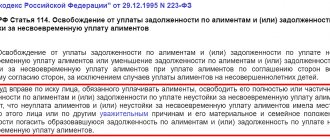The norms of the current legislation, namely Art. 1112 of the Civil Code of the Russian Federation, it is provided that debt in any form does not terminate if the debtor dies, but is subject to transfer, along with the rest of the inheritance, to persons claiming the inheritance of the deceased. In this regard, all citizens who have the status of creditors in relation to the deceased have the right to demand repayment of debt obligations, including alimony, from the heirs of the alimony payer.
Debt of alimony after the death of the debtor
Russian legislation protects the interests of minors from all sides. The child has the right to receive financial assistance in full. After the death of the alimony holder, the obligation to pay the debt is transferred to the heirs. They can pay off the debt from the funds received from the deceased if there is an inheritance.
The death of a person entails the following legal consequences:
- termination of any obligations;
- occurrence of obligations;
- shifting obligations to heirs.
According to Art. 120 of the Family Code of the Russian Federation, the obligation to pay alimony terminates when the following circumstances occur:
- the child reaches 18 years of age;
- death of one of the parties;
- the cessation of the need of the recipient of alimony or his acquisition of ability to work;
- adoption of a child, when the responsibility for providing for the child is transferred to new parents.
Expert commentary
Leonov Victor
Lawyer
It turns out that the heirs cannot be entrusted with the responsibility of raising and receiving current alimony after the death of the payer. As for debt, Article 1112 of the Civil Code of the Russian Federation states that the concept of inheritance includes not only the property of the deceased, but obligations, including debts. From the moment the will comes into force, alimony debt is distributed according to the order and shares of the heirs.
Important! The heirs are required to pay arrears of alimony.
If there is no inheritance, then payments are made from one’s own funds; if there is, then this can be done using inherited property.
Where to go to collect debt
Initially, the claimant must know information about the persons who accepted the inheritance. Then you need to try to resolve the issue voluntarily by contacting the legal successors.
You can go to court after receiving a refusal and the reluctance of your successors to cooperate.
Knowing the place of residence of the heirs, the claimant writes a statement to the district court.
It is possible to submit an application to the district court at your place of residence if the applicant has a minor child or is unable to travel long distances for health reasons.
Actions of the debtor after the death of the debtor
If the alimony payer is gone, the claimant is obliged to notify the bailiff of the fact of death. A copy of the death certificate is provided as confirmation. This must be done to prevent debt from increasing after the death of a citizen.
Next, you need to draw up an application asking to calculate the debt as of the date of death. The application is submitted to the head of the service or the bailiff himself leading the proceedings. In response to the request, the FSSP employee will issue a certificate indicating the amount of alimony debt at the time of the death of the alimony holder.
With the received certificate, the collector should apply to the judicial authorities to collect the debt from the debtor’s heirs. According to Art. 1175 of the Civil Code of the Russian Federation, the heirs are jointly and severally liable equal to the part that was received as a result of the inheritance. As a basis for making demands, one can refer to Article 1102 of the Civil Code, which speaks of the illegal enrichment of heirs due to failure to fulfill transferred alimony obligations.
Documents provided as evidence:
- An executive document issued by the court on the assignment of alimony. An alimony agreement certified by a notary is equivalent to a writ of execution.
- Documents from the bailiff service on the initiation of enforcement proceedings, the progress of the case, the amount of total debt, payment orders for the transfer of funds.
- Other documents including account statements, checks, receipts, certificates.
Rubric “Question/Answer”
My father paid alimony according to our verbal agreement with him. I didn’t go to court, I don’t have a writ of execution on hand. Can I count on repayment of the debt after the death of the alimony payer?
Expert opinion
Semyon Frolov
Lawyer. 7 years of experience. Specialization: family, inheritance, housing law.
Alas, this is impossible. The court needs proof of payment of alimony. If you agreed with the deceased orally, without drawing up writs of execution, you cannot demand payment of alimony debt from the heirs. It's simple - debt accumulates in case of non-payment and only in the presence of a writ of execution . This may be a writ of execution (IL), a voluntary agreement with the father, or a court order. Other ways to prove the fact of payment of alimony will lead nowhere. Naturally, you can try to come to an agreement with the heirs. But will they agree?
Is it possible to collect alimony debt after the death of the payer if 6 years have passed since the children came of age?
Expert opinion
Dmitry Nosikov
Lawyer. Specialization: family and housing law.
The legislation protects the rights of children, therefore, even in the event of the death of the obligated person, he retains the alimony debt. If a child is 24 years old, this does not mean that he will not receive child support. The child himself can become the claimant . He needs to find out who accepted the payer’s inheritance and contact these persons. It may be possible to agree on voluntary repayment of alimony debt. If not, the issue remains to be resolved in court. It is important that the plaintiff has an executive document, for example, an agreement or a court order. Then the bailiffs will be able to calculate the amount of the debt, and then the court will oblige the heirs to repay the debt within the inherited property. I would like to note that there is positive court practice in such matters. For example, Determination of the Judicial Collegium for Civil Cases of the Supreme Court of the Russian Federation dated 03/01/2016 N 45-КГ16-1
From what funds is the alimony debt passed along with the inheritance withheld? And do bailiffs have the right to withhold pensions and wages from the debtor’s heirs?
Expert opinion
Semyon Frolov
Lawyer. 7 years of experience. Specialization: family, inheritance, housing law.
Heirs who enter into an inheritance also assume obligations for the debts of the deceased person. If the inheritance includes an apartment or a garage, they cannot be seized. But you can foreclose on bank accounts (including where pensions or salaries are transferred). Collection takes place in court. If the plaintiff wins the case, the court issues a ruling in the form of a writ of execution. Next, the plaintiff takes it to the Bailiff Service, where enforcement proceedings are initiated. Based on the writ of execution, the amount will be withheld for alimony arrears. The heirs will be given a period to repay the debt. If there are no payments by this date, and the debt remains, the bailiff has the right to seize the salary and other income of the payers (Article 98 No. 229 of the Federal Law “On Enforcement Proceedings”).
Tips for heirs:
- Try to come to an agreement with the claimant (the child’s mother). Draw up a convenient payment schedule, enter into an agreement to repay the debt in equal monthly payments - in this way, the heir will be able to repay the debt within his share.
- Apply to the court for an installment plan, taking into account income and expenses. The application is submitted to the court that heard the case regarding the collection of arrears of alimony. If you achieve what you want, you can pay off the debt in installments. The main advantage is that the bailiffs will not seize your pension or salary.
- Provide the bailiff with certificates of your pension and salary account - they cannot withhold more than 50%. The heirs have the right to the second half (clause 2 of article 99 of Federal Law No. 229).
If any difficulties arise, contact our website lawyers!
What will happen to the alimony debt if none of the father’s heirs has entered into the inheritance?
Expert opinion
Dmitry Nosikov
Lawyer. Specialization: family and housing law.
The property of the testator, not accepted by anyone, will be considered escheated . This means that it will go to the state - or rather to the ownership of a municipal entity (city or district) - by virtue of Art. 1151 Civil Code of the Russian Federation. If the mother of a child files a lawsuit to collect arrears of alimony, she needs to correctly indicate the defendant's side. In this case, the defendant will be the city or district administration . Information about the subject can be found on the official website of the city or town hall. The collection procedure does not differ from that described in the article. Alimony is withheld against the inherited share of the father's property.
So, death stops further payment of funds, since alimony obligations are directly related to the personalities of the parties. But the death of the payer does not relieve the debtor’s legal successors from paying the debt incurred during his lifetime. This debt is paid from the inherited property that has become the property of the debtor's heirs.
If you need to collect alimony debt, and the payer has already died, do not delay this matter. Such disputes are difficult. The collector turns to the bailiffs/counts the debt himself, looks for heirs, meets with them, tries to come to an agreement, collects documents, identifies the defendant, files a claim, participates in the trial... and then controls the payment of the debt. And the heirs are trying to defend their rights. Acting alone is very difficult. Especially if you don’t know the algorithm of actions. To avoid mistakes, calculate debt, and prepare for court, consult a lawyer. He will guide you in the right direction, assess the risks and prospects of the business.
Watch a video about how alimony debts are inherited after the death of the payer:
Attention!
- Due to frequent changes in legislation, information sometimes becomes outdated faster than we can update it on the website.
- All cases are very individual and depend on many factors. Basic information does not guarantee a solution to your specific problems.
That's why FREE expert consultants work for you around the clock!
- via the form (below), or via online chat
- Call the hotline:
- Moscow and the Region
- St. Petersburg and region
- FREE for a lawyer!
By submitting data you agree to the Consent to PD Processing, PD Processing Policy and User Agreement.
Anonymously
Information about you will not be disclosed
Fast
Fill out the form and a lawyer will contact you within 5 minutes
Tell your friends
Rate ( 2 ratings, average: 5.00 out of 5)
Author of the article
Irina Garmash
Family law consultant.
Author's rating
Articles written
612
Procedure for going to court
It is better for the heirs to solve the problem of paying alimony on their own immediately after they enter into an inheritance. If they do not take any action to repay the debt, then the collector must go through several stages:
- Notify the bailiff of the death of the debtor.
- Draw up an application requesting the calculation of debt incurred during the life of the payer.
- File a claim in court. All heirs are indicated in the claim; responsibility for paying the debt will be distributed among them proportionally, on the basis of Art. 1175 of the Civil Code of the Russian Federation.
Statement of claim for collection of alimony debt (sample)
Often, court proceedings are the initiative of the alimony recipient. The main thing is that the application be submitted no later than three years after the death of the debtor, otherwise the statute of limitations will be missed.
According to the law, the entire amount of debt accumulated by the alimony holder during his lifetime must be paid. But in order to receive funds, it is necessary to indicate in the claim the grounds for payments, which in turn must be documented.
To increase the chances of your claim being granted, it is advisable to contact a competent lawyer to help you file your claim. In addition, it is necessary to provide the evidence mentioned above: payment orders, checks and statements confirming the transfer of funds, a certificate from the bailiff and a writ of execution.
Expert commentary
Shadrin Alexey
Lawyer
Based on practice, there are often situations when a defendant tries to appeal a court decision by filing an appeal and citing insufficient grounds. The heirs are trying to prove that the resulting debt relates to the obligations of only the debtor and does not affect them. But plaintiffs sometimes demand payment of funds every month, instead of a lump sum payment of the debt.
Can successors refuse inheritance?
The law does not oblige relatives to inherit. Each person decides independently whether he needs the property and debts of the testator.
There are two types of renunciation of inheritance. It is enough for assignees not to take any action for six months or to submit a written application to a notary.
Targeted refusal according to Art. 1158 of the Civil Code of the Russian Federation is carried out only by submitting an application. The heir must submit a waiver application within six months.
If the priority heirs refuse the property or do not accept it, then it passes to the relatives of the next priority. The ultimate legal successor is the state. The creditor may present his claims to the heir of the corresponding queue.
Obligations of heirs
Although the judiciary always sides with minors, the outcome of such proceedings is not always easy to predict. The judge has the right to reject the claim, referring to Article 120 of the Family Code, which talks about the termination of legal relations regarding alimony upon the death of one of the parties. This article makes it clear that third parties do not have any obligations in relation to the child. But in most cases, the judge makes a decision in favor of the claimant.
Heirs can pay off the debt using their personal or inherited:
- Money;
- real estate;
- shares and securities;
- intellectual property;
- own things;
- intangible values.
Arbitrage practice
In most cases, collection of alimony debt from an heir in favor of alimony recipients is successful. To do this, the following conditions must be met:
- The testator-debtor has property whose value is equal to or greater than the alimony debt;
- The debtor has heirs;
- These heirs accepted the inheritance.
If all these three requirements are met, the courts without any problems take the side of the plaintiff and collect child support debts from the heirs.
Indicative is the decision of the court of first instance of the Serdobsky City Court of the Penza Region dated December 23, 2011, which collected arrears of alimony from the heirs in the required amount.
Also on the Internet you can find enough decisions of courts of second instance, by which similar specified judicial acts were left in force.
If the recipient of alimony is the only heir
In judicial practice, the case of inheritance of all property of the alimony recipient by the second party of obligations occurs quite often. In such circumstances, all obligations to pay the debt are canceled, even if the total amount of the inherited property does not fully cover the debt.
Expert commentary
Kireev Maxim
Lawyer
The explanation for this situation is quite simple. Since in this case the death of the alimony provider entails the complete transfer of property to the claimant, there is simply no one to file a claim for further collection of the debt.
How much debt can you collect?
If the conditions for collecting alimony are met, requirements are imposed on the legal successors. The conditions of the inheritance case and the number of heirs suggest the development of the situation in several ways:
- one heir by law and will - pays the alimony debt alone;
- several heirs by law in equal shares - equal obligations to pay the debt;
- when determining shares in inherited property among heirs, debt obligations are proportional to the acquired share;
- in the absence of heirs or refusal of inheritance, there is no one to make demands for alimony.








